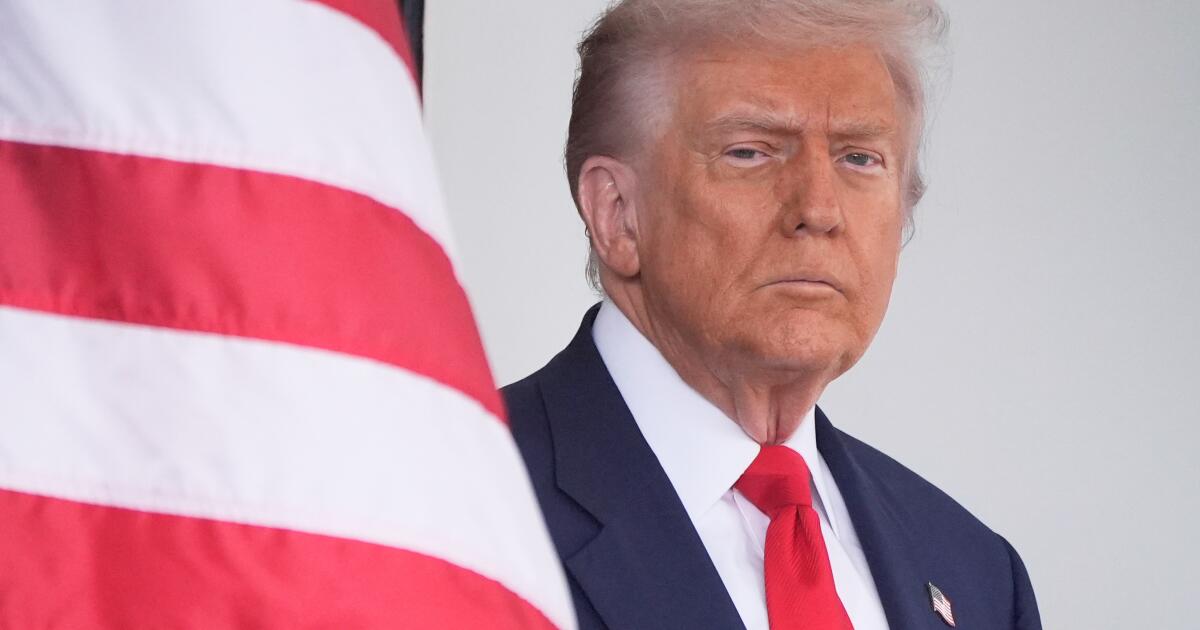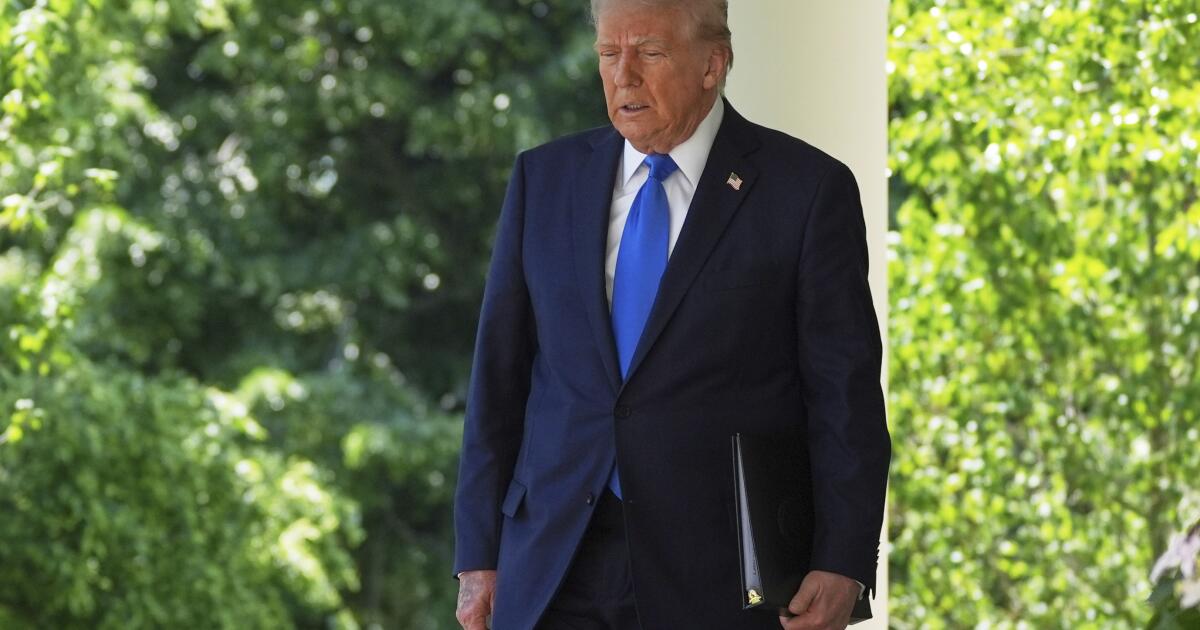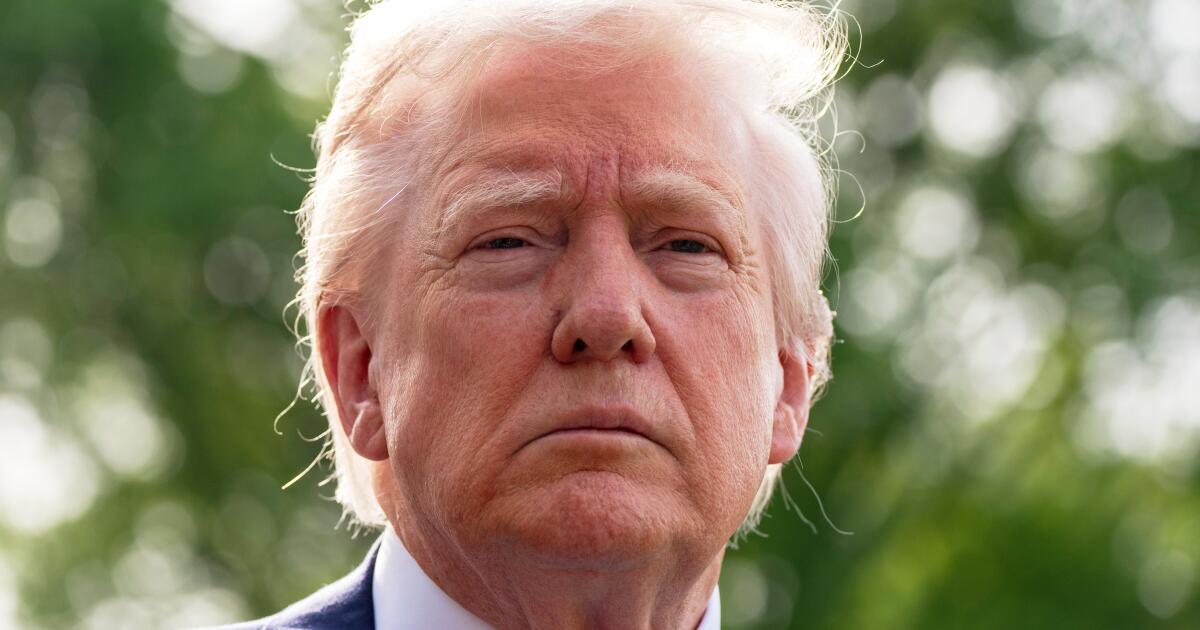Trump keeps name-checking the Insurrection Act as way to deploy troops
There are few laws President Trump name-checks more frequently than the Insurrection Act.
A 200-year-old constellation of statutes, the act grants emergency powers to thrust active-duty soldiers into civilian police duty, something otherwise barred by federal law.
Trump and his team have threatened to invoke it almost daily for weeks — most recently on Monday, after a reporter pressed the president about his escalating efforts to dispatch federalized troops to Democrat-led cities.
“Insurrection Act — yeah, I mean, I could do that,” Trump said. “Many presidents have.”
Roughly a third of U.S. presidents have called on the statutes at some point — but history also shows the law has been used only in moments of extraordinary crisis and political upheaval.
The Insurrection Act was Abraham Lincoln’s sword against secessionists and Dwight D. Eisenhower’s shield around the Little Rock Nine, the young Black students who were the first to desegregate schools in Arkansas.
Ulysses S. Grant invoked it more than half a dozen times to thwart statehouse coups, stem race massacres and smother the Ku Klux Klan in its South Carolina cradle.
But it has just as often been wielded to crush labor strikes and strangle protest movements. The last time it was invoked, Defense Secretary Pete Hegseth was in elementary school and most U.S. soldiers had not yet been born.
Now, many fear Trump could call on the law to quell opposition to his agenda.
“The Democrats were fools not to amend the Insurrection Act in 2021,” said Kevin Carroll, former senior counsel in the Department of Homeland Security during Trump’s first term. “It gives the president almost untrammeled power.”
It also precludes most judicial review.
“It can’t even be challenged,” Trump boasted Monday. “I don’t have to go there yet, because I’m winning on appeal.”
If that winning streak cools, as legal experts say it soon could, some fear the Insurrection Act would be the administration’s next move.
“The Insurrection Act is very broadly worded, but there is a history of even the executive branch interpreting it narrowly,” said John C. Dehn, an associate professor at Loyola University Chicago School of Law.
The president first floated using the Insurrection Act against protesters in the summer of 2020. But members of his Cabinet and military advisors blocked the move, as they did efforts to use the National Guard for immigration enforcement and the military to patrol the border.
“They have this real fixation on using the military domestically,” Carroll said. “It’s sinister.”
In his second term, Trump has instead relied on an obscure subsection of the U.S. code to surge federalized soldiers into blue cities, claiming it confers many of the same powers as the Insurrection Act.
Federal judges disagreed. Challenges to deployments in Los Angeles, Portland, Ore., and Chicago have since clogged the appellate courts, with three West Coast cases before the U.S. 9th Circuit Court of Appeals and one pending in the 7th Circuit, which has jurisdiction over Illinois.
The result is a growing knot of litigation that experts say will fall to the Supreme Court to unwind.
As of Wednesday, troops in Oregon and Illinois are activated but can’t be deployed. The Oregon case is further complicated by precedent from California, where federalized soldiers have patrolled the streets since June with the 9th Circuit’s blessing. That ruling is set to be reheard by the circuit on Oct. 22 and could be reversed.
Meanwhile, what California soldiers are legally allowed to do while they’re federalized is also under review, meaning even if Trump retains the authority to call up troops, he might not be able to use them.
Scholars are split over how the Supreme Court might rule on any of those issues.
“At this point, no court … has expressed any sympathy to these arguments, because they’re so weak,” said Harold Hongju Koh, a professor at Yale Law School.
Koh listed the high court’s most conservative members, Clarence Thomas and Samuel A. Alito Jr., as unlikely to push back against the president’s authority to invoke the Insurrection Act, but said even some of Trump’s appointees — Neil M. Gorsuch, Brett M. Kavanaugh and Amy Coney Barrett — might be skeptical, along with Chief Justice John G. Roberts Jr.
“I don’t think Thomas and Alito are going to stand up to Trump, but I’m not sure that Gorsuch, Kavanaugh, Barrett and Roberts can read this statute to give him [those] powers.”
The Insurrection Act sidesteps those fights almost entirely.
It “would change not only the legal state of play, but fundamentally change the facts we have on the ground, because what the military would be authorized to do would be so much broader,” said Christopher Mirasola, an assistant professor at the University of Houston Law Center.
Congress created the Insurrection Act as a fail-safe in response to armed mobs attacking their neighbors and organized militias seeking to overthrow elected officials. But experts caution that the military is not trained to keep law and order, and that the country has a strong tradition against domestic deployments dating to the Revolutionary War.
“The uniformed military leadership in general does not like getting involved in the domestic law enforcement issue at all,” Carroll said. “The only similarities between police and military is that they have uniforms and guns.”
Today, the commander in chief can invoke the law in response to a call for help from state leaders, as George H.W. Bush did to quell the 1992 Rodney King uprising in L.A.
The statute can also be used to make an end-run around elected officials who refuse to enforce the law, or mobs who make it impossible — something Eisenhower and John F. Kennedy Jr. did in defense of school integration.
Still, modern presidents have generally shied from using the Insurrection Act even in circumstances with strong legal justification. George W. Bush weighed invoking the law after Hurricane Katrina created chaos in New Orleans but ultimately declined over fears it would intensify the already bitter power struggle between the state and federal government.
“There are any number of Justice Department internal opinions where attorneys general like Robert Kennedy or Nicholas Katzenbach said, ‘We cannot invoke the Insurrection Act because the courts are open,’” Koh said.
Despite its extraordinary power, Koh and other experts said the law has guardrails that may make it more difficult for the president to invoke it in the face of naked bicyclists or protesters in inflatable frog suits, whom federal forces have faced down recently in Portland.
“There are still statutory requirements that have to be met,” said Dehn, the Loyola professor. “The problem the Trump administration would have in invoking [the law] is that very practically, they are able to arrest people who break the law and prosecute people who break the law.”
That may be why Trump and his administration have yet to invoke the act.
“It reminds me of the run-up to Jan. 6,” Carroll said. “It’s a similar feeling that people have, a sense that an illegal or immoral and unwise order is about to be given.”
He and others say an invocation of the Insurrection Act would shift widespread concern about military policing of American streets into existential territory.
“If there’s a bad faith invocation of the Insurrection Act to send federal troops to go beat up anti-ICE protesters, there should be a general strike in the United States,” Carroll said. “It’s a real break-the-glass moment.”
At that point, the best defense may come from the military.
“If a really unwise and immoral order comes out … 17-year generals need to say no,” Carroll said. “They have to have the guts to put their stars on the table.”


